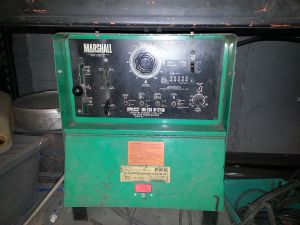Marshall Dynabolt 250 Amp AC/DC Tig Welding Set
Marshall Dynabolt 250 Amp AC/DC Tig Welding Set, used for accurate welding of steel, stainless steel, aluminium and alloys.
This machine requires training and experience in stick and MIG welding techniques before use.
If you want to quickly weld mild steel please consider using the stick welder.
A good intro to welding with aluminium can be found here..
http://www.lincolnelectric.com/en-gb/support/welding-solutions/Pages/aluminum-faqs-detail.aspx
How to assemble to TIG torch with picture is here
http://welders.tokentools.com.au/tig-torch-assembly/
Electrode Thickness, Amperage and Argon Gas Flow Settings can be obtained here
http://www.millerwelds.com/products/gunstorches/tig-torches/helpmechoose/
Filler Materials for aluminium here
http://www.lincolnelectric.com/en-us/support/welding-how-to/Pages/tig-welding-aluminum-detail.aspx
Update WIP
TIG (Tungsten Inert Gas) welding is particularly useful for aluminium, It uses an electrode nozzle with a fixed (should be permanent, but they do wear) tungsten tip where a plasma 'flame' is created (started with a high-voltage / high frequency starter) and used to heat the filler wire and joint. The nozzle allows a flow of inert shield gas around the working area, reducing slag creation and (particularly important with aluminium) oxidation.
The TIG welder is a 'stick' welder - the electrode / nozzle is held in one hand, and the filler wire applied with the other.
Shield gas
For the TIG we use a Pureshield Argon.
Capacity and rating
The Tig welder has a large range
Power is from a 63 amp socket, on the highest setting the Tig could draw more current than this
Controls
File:TIGWelderFrontPanel.JPG
Details on the front panel controls
| Name | Picture | Description | ||||||||||||
|---|---|---|---|---|---|---|---|---|---|---|---|---|---|---|
| Main On Off Switch | File:TIGWelderOn Off Switch.JPG | Main switch on the welder, remember to turn off the welder as much as possible in-between setting up for welds | ||||||||||||
| DC+ AC DC- selector | File:TIGWelderDC+ AC DC- Switch.JPG | Do not change this setting with the main power switch ON. This selector has three positions that control the mode of the welder
| ||||||||||||
| Working power range selector | File:TIGWelderWorkingPowerRange.JPG | Do not change this setting with the main power switch ON. There are three possible working ranges, low, medium and high. Each has a slightly different range for DC or AC
| ||||||||||||
| Percentage power dial | File:TIGWelderPercentagePowerWithinRange.JPG | Main power control dial, used to fine tune the amp control of the welder. This dial acts as a percentage of the current selected range. | ||||||||||||
| Remote control enable | File:TIGWelderRemoteAmpageControlSwitch KEEPswitchedOFF.JPG | Used to enable remote current control when a foot control is installed. Until we have a remote foot pedal this should be left in the OFF position. | ||||||||||||
| High Frequency control | File:TIGWelderHF OnAtStrike Off Continous Switch.JPG | Controls the high frequency generation of the welder, this switch has three positions and each has a set use.
| ||||||||||||
| Remote trigger enable | File:TIGWelderTorchSwitchEnable TIG-on STICKoff.JPG | This should be left in the ON position. Used to enable the remote trigger, only place in OFF position when doing Arc welding | ||||||||||||
| Gas overrun timer | File:TIGWelderGasOverrunTimer.JPG | Controls how long after arc cut off the gas will run for. Outer scale is tungsten width, inner scale is time in seconds |
Tungsten and collets
We have a selection of the following tungsten tips and collets to fit
| Size | Color band | Grade | Used for | Notes |
|---|---|---|---|---|
| 1.6mm | Red | 2% Thoriated | DCEN Steel | Slightly radioactive! Do not sharpen without wearing a dust mask. |
| 2.4mm | Red | 2% Thoriated | DCEN Steel | Slightly radioactive! Do not sharpen without wearing a dust mask. |
| 1.6mm | White | Zirconaited | AC Aluminium | |
| 2.4mm | White | Zirconaited | AC Aluminium | |
| 1.6mm | Gold | 1.5% Lanthanated | AC or DCEN, All rounder Steel or Aluminium | |
| 2.4mm | Gold | 1.5% Lanthanated | AC or DCEN, All rounded Steel or Aluminium |
Tungsten electrodes come in a a range of different grades/types, each performs differently and have their own uses.
They are marked with a colour band at one end, do not grind this off!
The following was borrowed from here
ZIRCONIATED Tungsten Color Code WHITE or BROWN, are best suited for AC Tig welding applications.
Zirconiated, White, AC Welding applications. Better start up than Pure Tungsten, Balls up well and has a more stable arc than Pure Tungsten. Better current carrying capacity and high resistance to contamination during welding.
LANTHANATED Tungsten Color Code BLACK, GOLD or BLUE, is suitable for AC & DC welding applications.
Lanthanated, Black, AWS Class EWLA-1.5, AC & DC welding applications. Non-Radioactive Good arc characteristics in ac/dc applications. Applications: carbon & stainless steel, nickel alloys and titanium.
CERIATED Tungsten Color Code GREY or ORANGE, are best suited for low amperage DC welding applications.
Ceriated, Grey, An excellent alternative to Thoriated tungsten especially in low amperage welding. Takes 10% less current to start and has a very stable arc.
PURE Tungsten Color Coded GREEN, are best suited for AC Tig welding applications.
Pure Tungsten, Green, AWS Class EWP, AC welding applications. Least expensive of all electrodes. Applications: aluminum and magnesium alloys.
THORIATED Tungsten Color Code RED, YELLOW, MAUVE or ORANGE, is best suited for DC Tig welding applications.
2% Thoriated, Red, AWS Class EWTH-2, DC welding applications. The most common type of electrode used today. Applications: carbon & stainless steel, nickel alloys and titanium.
Grinding tip shapes
Do not grind the end with the color band!
Training
https://wiki.london.hackspace.org.uk/view/Welding_Training
Power supply
A 63A plug and socket connection is used, with a pushbutton on/off control station and no-volt release.
RFID control of access will be installed shortly.
Tig welding tips
Random collection of useful links
